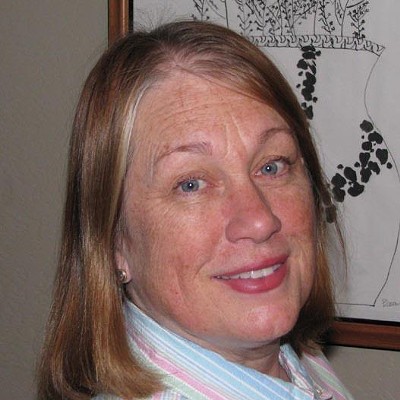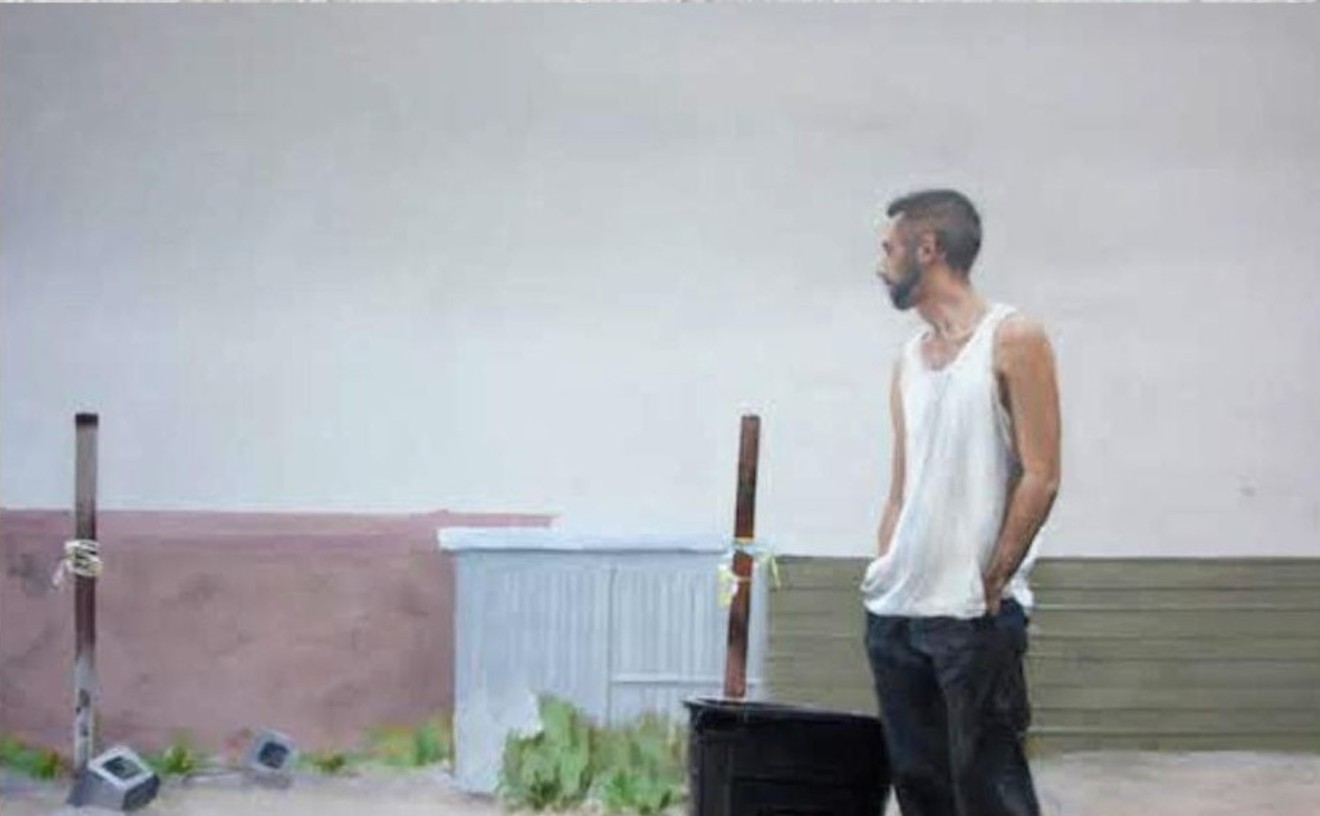Welcome back to Explicitly Graphic, a monthly by Cynthia Clark Harvey (who's working on a graphic novel of her own). From time to time, Harvey will review graphic novels, talk to artists, and dive into the scene of all things explicitly graphic. Today, she sits down with author and artist Matthew Parker.
Matthew Parker is a guy who isn't afraid to take an about-face when it looks like the smart thing to do. He did it in 2002, when he entered college at age 42, and did it again in 2009 when his agent convinced him to set aside his prose memoir in progress and recreate the memoir in graphic form.
Parker is the author of the recently released graphic novel, Larceny in My Blood, A Memoir of Heroin, Handcuffs, and Higher Education (Gotham Books, 2012).
See also: - Cartoonist Ted Rall on The Occupy Movement's Flawed Model, Upcoming Elections, and His Latest Work, "The Book of Obama" - Check It Out: Graphic Novels at Phoenix Libraries - Noteworthy Graphic Novels by Women: Recent, Upcoming, and One That I Cannot Friggin' Believe!
The facts of his bio read colorfully: he was raised by a criminally-inclined, yet loving, mother, was a pot dealer by age 13, and spent decades in incarceration and addiction. He then had a mid-life transformation that saw him transcend drugs and imprisonment and took him through Scottsdale Community College, ASU, and then on to Columbia, where he recently achieved an MFA in non-fiction.
Along the way, he's been a careful observer of his own life and the systems through which he's moved. In Larceny in My Blood, Parker draws (literally) witty parallels between the institutions of incarceration and those of higher education, e.g. community college = county jail, state lock-up = state university, federal prison = Ivy League school. Parker spent years in each of these settings, so, darkly funny as they are, his observations bear weight.
I spoke recently by phone with Matthew Parker; we traversed topics as diverse as Arizona weather, voter's rights, MFA programs, the process of creating a graphic novel with no art background, addiction treatment, and more.
So much of the book is set in the Valley, I found myself studying the maps you drew. They made the unfamiliar, such as the relative proximity of the downtown Phoenix jails and courts to one another, that much easier to digest. Now that you live in New York, is there anything you miss about Arizona? Sure, of course. My family. My family's still there. The weather. The weather for sure, when it's cold here. Riding my bike. I still have the motorcycle out there, I can't afford to garage here.
In the very first pages of the book you wrote about voting rights, which, of course, is news during the election cycle. I'm aware that states are different in how they grant (and deny) voting rights, but don't understand how a convicted felon gets their voting rights restored. In Arizona, simple. Just pay your fines. It's a poll tax. Not that the Supreme Court sees it that way. Other states are different, but that's how it is in Arizona.
You had written a substantial amount of a prose memoir while at Columbia when your agent turned you toward doing the graphic. Exactly how did that happen? I had finished six chapters of the prose memoir and sent them to my agent; I didn't get an agent until I was almost done with my MFA. One day I was with him and showed him six pages of a graphic that I'd done. He took them and said he'd get back to me, but by the time I got home he'd called me four or five times. When I called him back, he said this is what we're doing. So that's what we did. At that time, I'd never read a graphic all the way through except Persepolis. I learned as I went along. I'd send him pages of prose taken from the memoir with stick figure drawings and he edited it, sent it back and I'd work on it. There was a long period of time where I was just working on the graphic, drawing and doing all the lettering by hand and no writing at all. And it drove me crazy, not to be writing. So late at night, I'd write these crazy, ranting op/eds and send them in. None of them ever got published, and after I finished the graphic, I sent off a letter explaining why I had been writing all that crazy stuff.
Much of the book is drawn in a simple style, with the major exception being your portraits of musicians that you admire. Most all of the pictures of yourself are not realistic, more comics-style. Two consecutive frames that really stood out to me were at a highly emotional part of your story. Those two self-portraits are much more representational. Was this a deliberate choice? In some ways, yes. I've always been able to look at a picture and draw it. So all the musicians were drawn from looking up photos of them, well, except for Chrissie Hynde, I couldn't find any good pictures of The Pretenders, and then drawing from those. And I was learning as I was going along. We'd sold the book just from those first six pages. Finally, I started taking pictures of myself and using them to draw from. Then I found out that's how Alison Bechdel works. I didn't know that when I started doing it. So the art got better as it went along. I probably should have gone back and redone those first six pages, but I didn't.
What do you think about private prisons? Backing up, do you follow Arizona politics? Yeah. I have a friend who's from Virginia and we had a bet going of whose state had the worst governor. And I won. Or lost, depending on how you look at it.
Arizona recently awarded a contract for, something like a thousand beds, to a private prison corporation, when it was unclear why the new beds were needed. So what do you think about the move toward private prisons? There are a lot of problems with them. They aren't even secure; I'm sure you remember those guys that escaped from the private prison and wound up killing some people. I was in one of them. Florence West, it's a DUI prison. It's warehousing at its worst.
You write in the book that the failure rate for addiction treatment and MFA programs is about the same. What is that rate exactly? Something like 80 to 90% failure rate, if you measure treatment by whether you stay off drugs and MFA's by having a book published, the failure rates about equal. (The following question was submitted and answered via email--I had a power interruption that killed my landline and computer while we were talking)
You wrote that (Judge) pro tem Ellis talked to you about how junkies reach a breaking point at 40 and that you didn't forget this. You, too, made a decision at 40. So do you think she planted the seed of a self-fulfilling prophecy, or was she telling you a fact that proved true for you or was it just something that you remembered? I think she purposefully planted the seed. She was quite knowledgeable when it came to heroin addiction. I mention her again on page 260; how I remembered what she had said and how it fed into my decision to get clean on the day I turned 40 in the Madison Street Jail. It may have been her statement that junkies usually get clean at age 40 proved true for me, but it's also true that many things converged on my 40th birthday. But there's no denying that pro tem Lindsay Ellis was a big factor in my decision. So much so that I've been meaning to write her and thank her.
You've resumed work on the prose memoir, but in the future would you ever consider another graphic novel? Maybe fiction? Sure, if the money was right. I'm working on a (prose) novel, too. I'm trying to get a few books published, because as an MFA, you'll never get tenured unless you publish. I don't want to be an adjunct. I might as well go back to being a carpenter.











